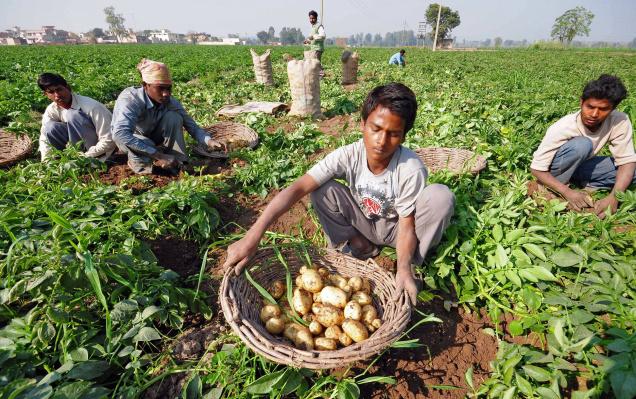
Farmers’ right to well-regulated markets is critical, and stands apart from Minimum Support Price (MSP) which means security, said Senior Fellow at Centre for Policy Research (CPR) Mekhala Krishnamurthy on January 9, 2021, during an in-depth virtual conference organised by organisations People First and the Nation for Farmers.
In a detailed critique of the hurriedly passed three farm bills, both speakers, Krishnamurthy and retired IAS officer Surendra Nath argued that the three laws – the Farmer’s Produce Trade and Commerce (Promotion and Facilitation) Act, the Farmers (Empowerment and Protection) Agreement on Price Assurance & Farm Services Act and the Essential Commodities (Amendment) Act – reveal what happens when a government fails to factor in pre-existing knowledge in law-making. The session was titled, ‘Farm Laws, Food Security and PDS.’
“One of the persons at the Madhya Pradesh APMC told me that it takes time to regulate the market but not much time for pulling it apart/ruining the market,” said Krishnamurthy, recollecting her visits to various districts of Madhya Pradesh such as Dewas, Harda and Sehore. The central government had bypassed the first principle of regulation by bypassing state governments and forcibly passing the three farm Bills, she stressed.
Regarding APMC laws, Krishnamurthy talked about valuable sections of the Madhya Pradesh APMC law such as Section 37 that ensured mandis (markets) took securities for farmers. The law required that APMCs hold traders to securities, protecting farmers in the eventuality of buyers failing to pay farmers on time. On the other hand, the new Acts do not ensure a similar mechanism to record and make available price information collection, while allowing payments to take place outside of the markets.
“It is important to discuss how new reforms compromise attempts to improve regulation of agri-markets,” she said. At the same time, Krishnamurthy also acknowledged the need to improve certain parts of the law such as ones that asked for conciliation boards even with absconding offenders who had run away with farmers’ dues. She called for people to compare these modal Acts with the new farm laws. Moreover, she also cleared the confusions between APMCs and MSP by saying, “The role of mandis is not to assure MSP but to create well-regulated primary and secure spaces/areas for farmers’ sale. We need to get this system right.”
People had confused mandis as a space for assuring MSP when in reality, mandis assured timely payment and locations for credible market price delivery, she said. This is unlike the hubs that work outside mandis that are periodic and cannot ever work as a level-playing field. Meanwhile, MSP in its current design doesn’t serve as a parity price or protection price but as the signal of an assured market with an indicator to farmers to continue growing certain crops. However, there have been experiences wherein some states adopted decentralised procurement systems with district-wise limits on the quantity of procurement. These limits often benefitted bigger farmers due to local dynamics. Thus, Krishnamurthy argued for better policies and schemes that take small and marginal farmers into consideration. Lastly, she asked everyone to keep the agro-ecological costs in mind while thinking of inclusive schemes.
“Madhya Pradesh has demonstrated how a state with zero procurement can become the largest contributor to wheat procurement in about a decade. But this has had consequences for agro-ecological diversity both in terms of the variety of wheat and other commodities that could have been procured,” she said.
Similarly, Nath who worked for the Government of India in the early 2000s, praised Madhya Pradesh APMCs for creating committees consisting of elected representatives from among agriculturists, traders, gram panchayats, zilla panchayats, MPs and MLAs. Such a group ensured better prices for agriculture products at the market, he said.
And so, he condemned the Farmers (Empowerment and Protection) Agreement on Price Assurance and Farm Services Act fails to ensure immediate payment to farmers unlike previous market laws. Where Madhya Pradesh markets previously demanded payment on the same day of purchase, buyers now have the option to make the payment within three days of the deal.
“What is the great urgency for the central government to come up with such Ordinances even without a background paper? I fail to see what is wrong with the APMC system,” he said. On the Essential Commodities Act, Nath said he failed to understand the complete removal of hoarding limits that previously prevented an adverse decrease in prices with the help of the Food Corporation of India (FCI). Further, he questioned how the government expected sub-district magistrates (SDMs) to regulate mandis and take over the duties of the FCI. The SDMs had many tasks and would simply not be able to do so. He questioned the wisdom of abolishing a well-regulated market when the alternative was so bleak. Moreover, he pointed out that the FCI served as the backbone of the Food Security system.
“Already FCI balance sheets are not viable and on the verge of being abolished. How will you run the food security system? The Food Security Act says that 70 per cent of the rural population and 50 percent of urban population should get wheat at Rs. 2 per kg, rice at Rs. 3 per kg and minor millet at Re. 1 per kg. How will you do this without the FCI? How will you create competition outside the market? What is there to defend in the new laws?” he said.
He urged the central government to think long and hard on whether India required a regulated market for agriculture commodities and if not, he asked the government to give valid reasons as to why. First and foremost, a meaningful dialogue with farmer organisations and state governments was a must, he added.
Related:
Centre won’t repeal farm laws: Haryana CM Khattar exposes Centre’s plans
Farmers create new protest site at Gangaicha border, intensify struggle
Do farmers’ demands benefit India’s hungry population?
Bihar govt repression continues: 10,000 farmers lathi charged in Patna.